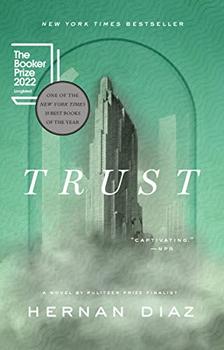Summary | Excerpt | Reading Guide | Discuss | Reviews | Beyond the book | Read-Alikes | Genres & Themes | Author Bio

An unparalleled novel about money, power, intimacy, and perception.
Even through the roar and effervescence of the 1920s, everyone in New York has heard of Benjamin and Helen Rask. He is a legendary Wall Street tycoon; she is the daughter of eccentric aristocrats. Together, they have risen to the very top of a world of seemingly endless wealth—all as a decade of excess and speculation draws to an end. But at what cost have they acquired their immense fortune? This is the mystery at the center of Bonds, a successful 1937 novel that all of New York seems to have read. Yet there are other versions of this tale of privilege and deceit.
Hernan Diaz's Trust elegantly puts these competing narratives into conversation with one another—and in tension with the perspective of one woman bent on disentangling fact from fiction. The result is a novel that spans over a century and becomes more exhilarating with each new revelation.
At once an immersive story and a brilliant literary puzzle, Trust engages the reader in a quest for the truth while confronting the deceptions that often live at the heart of personal relationships, the reality-warping force of capital, and the ease with which power can manipulate facts.
The novel is like a feminist retelling of a classic, male-oriented story, except that the original story is also one that Diaz wrote. Look at what is missing from these accounts, he implores us. Who do you believe? Trust is conventional in that our most pressing questions of plot are answered at the end, but there is no climactic eureka moment, where some crime is solved and the criminal is dramatically exposed—although there is one reveal, late in the book, that provides that satisfying feeling of shock and recognition: "Of course, how could I have not seen it coming?!"..continued
Full Review
 (837 words)
(837 words)
(Reviewed by Chloe Pfeiffer).
Hernan Diaz has said about writing his novel Trust that, despite the numerous books depicting "the symptoms of wealth," "there are very, very few novels that deal with the process of accumulation of capital. This, to me, was baffling." This isn't surprising to me, as the accumulation of capital seems narratively uninteresting, at least less interesting than stories about the lives of wealthy people or the psychological wounds that keep them from appreciating their money. The accumulation of capital Diaz is talking about—investment—is not even necessarily "striking it rich." It is often having a significant amount of money in the first place and growing it, which is interesting in its perverse banality, but not exactly exciting. ...

If you liked Trust, try these:

by Nnedi Okorafor
Published 2025
In this exhilarating tale by New York Times bestselling and award-winning author Nnedi Okorafor, a disabled Nigerian American woman pens a wildly successful Sci-Fi novel, but as her fame rises, she loses control of the narrative—a surprisingly cutting, yet heartfelt drama about art and love, identity and connection, and, ultimately, what...

by Benjamin Labatut
Published 2024
From one of contemporary literature's most exciting new voices, a haunting story centered on the Hungarian polymath John von Neumann, tracing the impact of his singular legacy on the dreams and nightmares of the twentieth century and the nascent age of AI